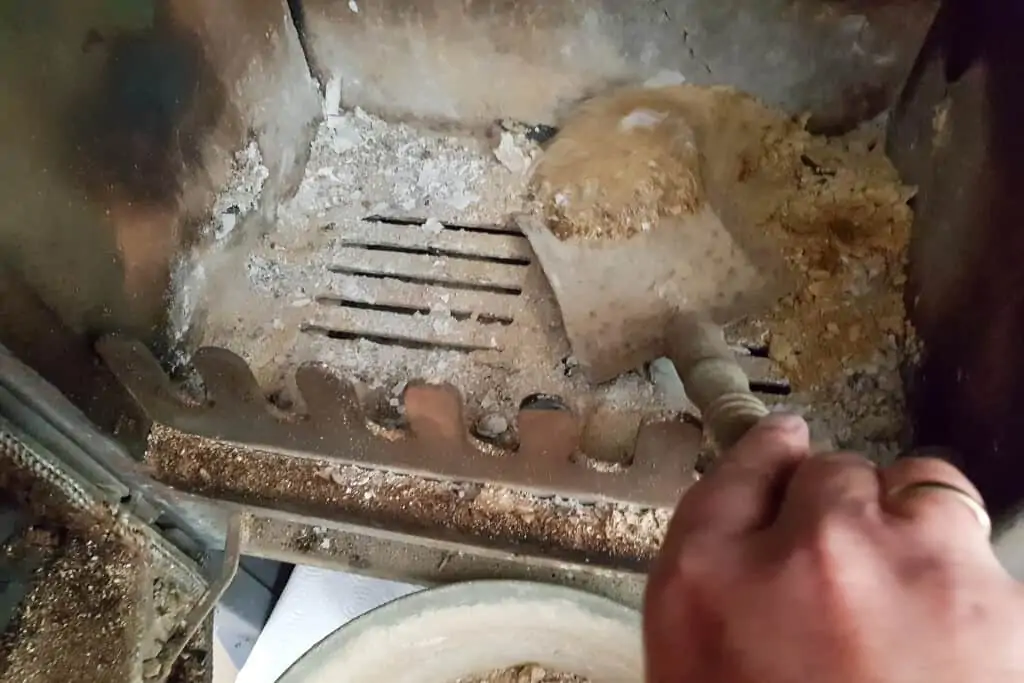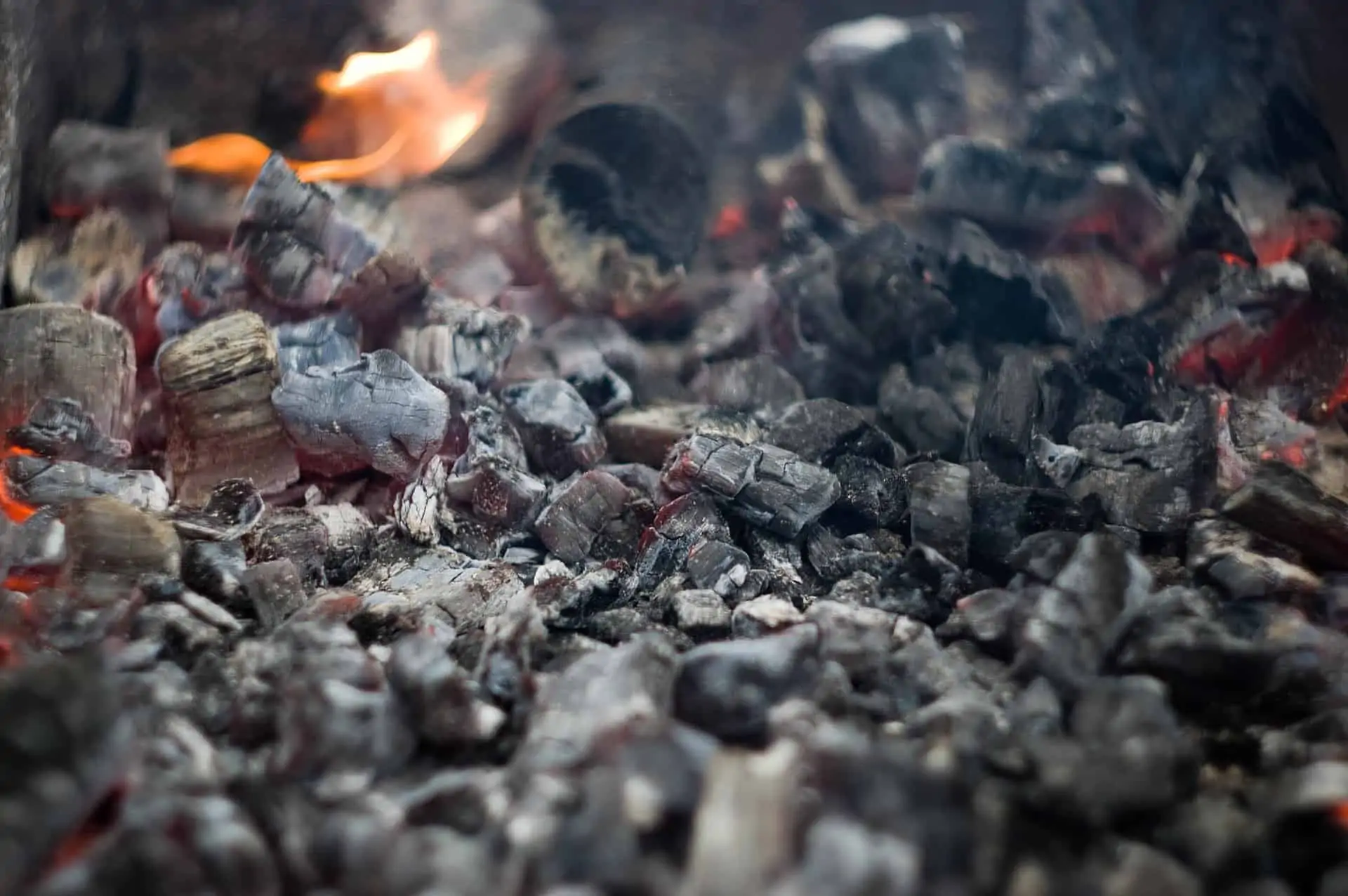As an Amazon Associate I earn from qualifying purchases.
Watching fires makes you feel alive. If you’re crazy.
The thing is, fire is actually a life-giving force for many forests and ecosystems throughout the world. Why is that?
It seems common knowledge that some seeds (such as those for pine trees) need fire to open and become viable. But is that the only reason? Is a fire (and its ashy byproduct) good for your soil?
I was pondering all of this as I cleaned out my wood-burning stove this spring and, if it was beneficial, you can bet that the ash would be going straight into my compost.

Many people are actually concerned that composting wood ashes will harm their compost piles. Or, if they’re very forward-thinking, that using it in compost and then spreading their compost will harm their plants. Well, the answer probably won’t be all that surprising.
When used in moderation, wood ash can be incredibly beneficial for your compost and soil. It can help balance the pH, provide both macro and micro-nutrients (including calcium, potassium, phosphorus, and zinc), and increase the nutrient carrying capacity of your compost.
What is Ash? Can I Add Charcoal Instead?
Wait, what the heck is this “ash” stuff that I’m adding to my compost pile? Well, for the sake of simplicity, I’m choosing to lump together several different things under the umbrella term ashes.
So when I say the word, I’m referring to the entire remnants of a wood-burning fire. This may be a campfire, ashes from a wood-burning stove, or even the remains after your burn garden detritus.
You may see people adding “ashes” or “charcoal” to their soil/compost but for our purposes, they’re one and the same. Technically, ash is the completely burned portion that is powdery and gray while charcoal is the large chunks that are not completely broken down. Go ahead and throw both into your heap.
The Benefits of Composting Wood Ashes
Adding wood ash to your compost has tremendous benefits both for the microbes in your pile (and therefore your pile as a whole) and the plants that will receive your compost when it is finished. Let’s talk about the three main benefits you’ll get if you add ash to your compost:
1. A More Balanced pH
While it doesn’t get the airtime it deserves, soil pH is absolutely critical for your garden’s success. Even if your soil is full of nutrients, an inhospitable pH (which is plant-dependent) can reduce the available nutrition
Wood ashes are typically 25% calcium carbonate by volume. While calcium is essential for plant growth its presence means that ashes are quite alkaline (the opposite of acidic). Having a pH greater than 7.0 means that ashes can be quite caustic if you’re too heavy-handed.
If you’re aren’t using wood ash specifically to balance your soil’s pH, be judicious when applying it. The best method is simply to add a couple of cups of ashes over the top of your compost and rely on the microbes and decomposition rate to tell you about the pH. If you’re going to add it directly to the soil, there are a few things you can do to protect your plants.
If you’re going to use ash as a natural fertilizer, you can bring the pH more towards neutral by mixing it with some soil or finished compost before adding. This spreads it out and it is less likely to affect your plants negatively.
Mixing it with water, however, would be inadvisable as ash can become quite caustic when mixed with water (it was once used to treat/clean wounds). Whichever preparation method you choose, avoid adding ash directly to young or tender plants.
As ideal soil pH is between 6.0-7.0 (slightly acidic) the addition of ash probably isn’t necessary or advantageous if you have alkaline soil.
2. Macro and Micro-Nutrients (Potassium, Phosphorus, Calcium, etc.)
So if ashes are 25% calcium carbonate then what makes up the rest? Luckily for us, good things!
Wood ashes a good source of phosphorus and a great source of calcium, both of which are members of the “big three” in manufactured fertilizers.
If ashes were a fertilizer, the nutrient profile would be 0-1-10 meaning that it contains 0% nitrogen, 1% phosphate (providing phosphate), and 10% potash (providing potassium). Quite respectable for a waste product!
In addition to the major nutrients, ashes provide your compost with micronutrients such as boron, copper, iron, manganese, and zinc.
These nutrients reach your soil the same way all compost nutrients do, by being consumed by microbes. The (hopefully) thriving microbial community then carries those nutrients into your soil where they pass them off to plants.
3. Increased Nutrition Holding Capacity
When I was completing my EMT certification, I was the lucky person in the class that was selected to drink a vial of “slurry.” Which, to my chagrin, turned out to be a milkshake of activated charcoal and water. It wasn’t delicious.
We had activated charcoal available to be administered in case of poisoning. Toxins bind to its massive surface area and can be carried out of the body in the natural way.
This massive surface area is also one of the reasons that ashes/charcoal are so useful in compost. Instead of toxins, the massive surface area (10g of activated charcoal has the same surface areas as a football field…) attracts nutrients which are then carried into your soil via the microbes that consume them.
Ashes are also helpful if you have significant rain and cannot cover your compost. The large bundles of nutrients that bind themselves to charcoal molecules are less likely to be washed out than their free-floating compadres.
Things To Avoid (Or At Least Be Aware Of)
- Know where your ashes came from. Many ashes can have residual chemicals or heavy metals depending on the type of wood that was burned. While your microbes and soil are capable of handling most of this, it’s best to only use ashes from clean unprocessed wood.
- Know what your soil and plants need. If you have acid-loving plants (such as blueberries) don’t go crazy with ashes. Test your pH and, if you over added ashes, you can use lime or ericaceous compost to balance it out again.
- Be moderate when uses ashes. As I mentioned above, over-use of ashes can raise your pH too much, lock up your soil’s nutrients, and even kill small/tender plants. Start off slow!
Following those few guidelines should keep you from ruining your compost pile when you add ash.
Conclusion:
So it adding wood ash to compost worth it? A resounding yes! While I wouldn’t go out of my way to seek it out, adding ashes to your compost is far preferable to simply throwing it away.
If, however, you’re looking for a safe way to utilize weeds in your compost or amend your soil, ash just might be your very best friend! Happy composting!
Can You Compost Oats? (A Guide to Oatmeal and Oat Products)
At A GlanceYes, you can compost oats and oatmeal as they are organic materials that…
Can You Compost Oil? (Yes, but only a little…)
At A GlanceIt’s not recommended to compost oil as it can cause several issues in…
Composting Nectarine Pits – What You Need to Know
At A GlanceComposting nectarine pits can be a bit challenging due to their hard and…
Composting Newspaper with Color Ink – What You Need to Know
At A GlanceYes, you can compost newspaper with color ink, but it’s preferable if the…
Can You Compost Noodles? A Starchy Foods Composting Guide
At A GlanceYes, you can compost noodles as they are a biodegradable organic matter. Whether…
Can You Compost Nut Shells? (Yes…but probably don’t…)
At A GlanceYes, you can compost nut shells, but there are certain considerations to be…
1. Avoid using wood ashes in excess – they can contain trace amounts of heavy metals, however, the harmful effects of such metals can be mitigated by ensuring a healthy microbial population in your soils. Just avoid using ashes in excess.
2. Do not use wood ashes to fertilize acid-loving plants (e.g. blueberries). Erecacious Compost.
3. Avoid spreading wood ashes around newly planted seedlings or seeds.
4. If you’re not composting wood ashes before applying them to your garden, try mixing the ashes with some soil. Do this prior to applying them to your garden. Wood ashes can be quite caustic when combined with water, so pre-mixing them with soil before applying can reduce many mishaps.

